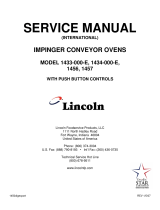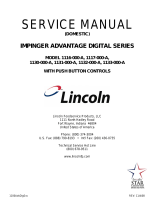
Impinger I – 1450 Series Electric Service Manual - Domestic
6
transformer. If no voltage is present, trace wiring back to
oven power switch. If voltage is present, check for
24VAC at transformer secondary. If there is primary
voltage, but no secondary voltage, replace control
transformer.
Oven control Check for 24VAC supply to oven control. If no voltage is
present, trace wiring back to control transformer. Check
for supply voltage to oven control. If no voltage is
present, trace wiring back to hi-limit thermostat. If
voltage is present, check for a read-out on the display. If
there is no read-out on the display, replace oven control.
If there is a read-out on the display, set the oven control
to maximum temperature (see installation operations
manual for temperature adjustment). With the oven
control at maximum temperature, check for supply
voltage to the heat contactor. If there is voltage at the
heat contactor, proceed to “Heat contactor “. If there is
no voltage at the heat contactor, trace wiring back to the
oven control. If there is no voltage output at the oven
control, check the read-out on the oven control. If the
oven control reads “PROBE FAIL” this indicates that the
thermocouple has failed or become disconnected from
the oven control
Thermocouple Check to see that the thermocouple is securely
connected to the oven control. If the thermocouple is
connected to the oven control, and the display indicates
“PROBE FAIL”, disconnect the thermocouple from the
oven control and measure the resistance of the
thermocouple. The thermocouple should read approx.
11Ω. If these readings are not achieved, replace the
thermocouple. If these readings are correct, proceed.
Oven control If the thermocouple checks good, but the oven control
display indicates that there is a thermocouple failure,
replace the oven control. If the oven control indicates a
temperature reading, but the oven will not heat, proceed.
Thermocouple WITH POWER ON AND THERMOCOUPLE
ATTACHED TO THE OVEN CONTROL: Measure the
DC millivolt output of the thermocouple. Refer to the
thermocouple chart (located in the “Removal” section of
the manual) for proper millivolt readings. If these
readings are not achieved, replace thermocouple.
Oven control If the thermocouple checks good, but there is no supply
voltage output to the heat contactor, replace the oven
control. If there is supply voltage output to the heat
contactor, proceed.
Heat contactor(s) Check for supply voltage to the heat contactor. If voltage
is present, listen for contacts to open and close. Also
check for opens or shorts in the operating coil. Replace
heat contactor as needed.
Intermittent heating Thermal/overload of main fan
motor
The main fan motor is equipped with internal thermal
protection and will cease to operate if overheating
occurs. As the motor overheats and cool, this will cause
the heating system to cycle on and off intermittently.
Improper ventilation or lack of preventive maintenance
may cause this problem. Also most of the problems
listed under “Oven will not heat” can cause intermittent
failure.
Conveyor will not run Incoming power supply Check circuit breaker, reset if required. Check power
plug to be sure it is firmly in receptacle. Measure
incoming power, call power co. if required.
Fuse, 10 Amp Check, replace if necessary.

























